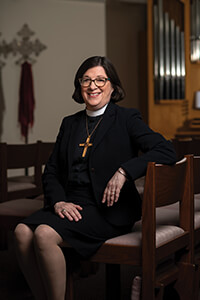Happy New Year!
December 28, 2018
Editor’s note: This is a reprint of the January 2017 column from the presiding bishop of the Evangelical Lutheran Church in America.
Ah, a new year! It opens up before us with infinite possibilities like brand new notebooks at the beginning of the school year or the beginning of football season in Cleveland—everyone has a 4.0, everyone is undefeated!
At the turn of the new year it seems possible to slough off the failures and disappointments of the past, leave one’s old self behind and start a new life. In this glow we begin to make all kinds of resolutions, not just for the amendment of our lives but for the perfection of our future. It’s a wonderful space of hope and potential. It’s also ephemeral—morning dawns on Jan. 2.
We are strange creatures—bounded and finite, yet aware of the infinite; marked by brokenness, yet with the memory of Eden. I think this tension becomes more acute at nodal times: the beginning of a new year, venture or relationship, the move to a new place or a new stage in life. We know, as the psalmist wrote: “Yet you have made them a little lower than God, and crowned them with glory and honor” (Psalm 8:5).
And we know that we are not quite right “since all have sinned and fall short of the glory of God” (Romans 3:23).
This is a very Lutheran understanding of the human condition. We know we are simultaneously saint and sinner. It’s when we deny this truth or when we believe that we can fix the sinner and become the saint all by ourselves that we get into trouble. Our efforts for perfection bring frustration and real pain to ourselves and to others. The demands we place on ourselves to get our lives together, especially when can’t quite bring it off, lead to despair or at least to fatalism. Or, believing that we have got it all together, we can fall into the trap of self-righteousness.
Here is where the great gift of grace, especially as it comes to us in baptism, helps us make sense of our lives and resolves the stress of New Year’s resolutions—it acknowledges that we are broken and does away with the false hope or the intolerable burden of our being able to make ourselves right. “It brings about forgiveness of sins, redeems from death and the devil, and gives eternal salvation to all those who believe it, as the words and promise of God declare” (Small Catechism).
And it joins us to the death and resurrection of Jesus Christ. “Do you not know that all of us who have been baptized into Christ Jesus were baptized into his death? Therefore we have been buried with him by baptism into death, so that, just as Christ was raised from the dead by the glory of the Father, so we too might walk in newness of life” (Romans 6:3-4).
We have already died the only death that really matters—we have died to sin and its consequence, death. We are a kind of walking dead—with all of popular culture’s fascination with zombies, we may have found ourselves a niche!
New Year’s resolutions can be a burden because, except for the most disciplined among us, it’s a good bet we will make the same resolutions next year. The old creature is to be drowned daily but, as theologian Karl Barth once wrote, “the old creature is drowned in baptism but is a good underwater swimmer.”
Here is where it is necessary to hear Paul’s letter to the Romans—“all have sinned and fall short of the glory of God”—not as final, nor as a bludgeon to get people to fall into line, but as the truth.
The very next thing Paul wrote is: “They are now justified by his grace as a gift” (Romans 3:24).
Now we have the possibility of daily repentance because we have been given the gift of new life. Now resolutions can be made and attempted, not because our life depends upon them, but because we are free. Happy New Year!
A monthly message from the presiding bishop of the Evangelical Lutheran Church in America. Her email address: bishop@elca.org.


